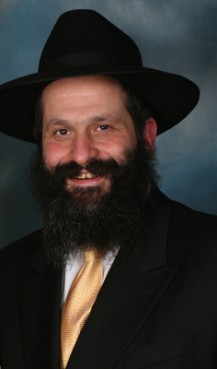
(RNS1-APR19) Jewish groups have rallied behind former Agriprocessors head Sholom Rubashkin, who faces a possible life sentence on 86 counts of money laundering and mail, wire and bank fraud. For use with RNS-RUBASHKIN-JEWS, transmitted April 19, 2010. RNS photo.
(RNS) As Sholom Rubashkin sits in an Iowa jail awaiting a possible life sentence on fraud charges related to his now-defunct kosher meat business, his ultra-Orthodox Jewish support base has ramped up protests over his case.
Through an online petition, media outreach, Facebook pages and Twitter feeds, some rabbis have called it a “sacred obligation” for Jews to contact the Justice Department before Rubashkin’s April 28 sentencing.
While their grassroots efforts stop short of claiming anti-Semitism against the former CEO of Agriprocessors — the Postville, Iowa plant where a 2008 government raid found hundreds of undocumented workers — they believe some discrimination has occurred.
The now infamous raid led to a financial investigation and Rubashkin’s conviction last November on 86 counts of money laundering and mail, wire and bank fraud charges. Prosecutors later dropped the immigrant labor charges; Rubashkin and several former Agriprocessors managers still face misdemeanor state charges of child labor violations.
“He looks different, and he’s being treated differently,” argues Rabbi Menachem M. Katz, of the Aleph Institute, a nonprofit organization that serves Jewish inmates. “No one called him a dirty Jew or painted a swastika anywhere, but he’s an ultra-Orthodox Hasidic Jew dealing with the justice system in a place that doesn’t have Jews, in a jury pool that doesn’t have Jews, in a state with very, very few Jewish residents.”
The “Justice for Sholom” Web site (http://www.justiceforsholom.org) lists eight major complaints, ranging from how the government conducted the raid to the denial of Rubashkin’s request to spend Passover under house arrest while awaiting sentencing.
Last year, the wider Jewish community rallied to help overturn an initial denial of bail when prosecutors feared Rubashkin would flee to Israel and attempt to claim citizenship under Israel’s Law of Return.
Now that the 51-year-old father of 10 faces a possible life sentence, a range of Jewish organizations and religious freedom advocates are paying close attention again, particularly since such a harsh penalty would make Rubashkin ineligible for a correctional facility that can accommodate Hasidic Jews.
Out of about 250,000 federal inmates, fewer than 3,000 are observant Jews; only a few dozen are ultra-Orthodox adherents, Katz said. Most go to Otisville, N.Y., or Fort Dix, N.J., where the facilities can handle their special diets, group prayers and other religious needs. Those facilities, however, do not accept prisoners with long sentences.
The Becket Fund for Religious Liberty is monitoring the case, said Eric Rassbach, the organization’s national litigation director. Federal prisons tend to be more accommodating of religiously observant inmates than state and county facilities, and should be able to at least provide kosher food and allow him to maintain his traditional appearance, he said.
With the exception of the outcry over the idea that Jews pose a unique flight risk to Israel — which has an extradition treaty with the U.S. — fellow Jews are not uniformly united behind Rubashkin, however. Non-Orthodox Jews have been among his strongest critics, including religious leaders and organizations that had repeatedly raised concerns about Agriprocessors’ treatment of workers.
“Based on Jewish values, what was alleged to have occurred at Agriprocessors was disturbing to many Jews,” said Gideon Aronoff, president and CEO of the Hebrew Immigrant Aid Society. “It is crucially important that the trial be conducted fairly, not benefiting him or treating him worse because of his Jewish faith. The same goes for the kosher meat industry.”
Rabbi Morris Allen, a Conservative Jew whose efforts to create an ethical kosher standard grew out of the Agriprocessors case, believes Rubashkin has received fair — and perhaps even better — treatment compared to other white-collar criminals.
Rubashkin’s trial was moved from Iowa to South Dakota to address concerns about a fair jury pool; he was permitted to travel to New York for Jewish holidays; he was offered a plea deal; and has enjoyed steadfast financial and emotional support from his community throughout the trial, Allen said.
And while a life sentence may seem extreme for inflating the value of his company to secure a $35 million line of credit, sentences have increased for fraud cases in recent years, as investors and taxpayers demand greater accountability from the business world, said Peter J. Henning, a white-collar crime expert and professor at Wayne State University Law School.
(OPTIONAL TRIM FOLLOWS)
Given that Rubashkin’s losses pale in comparison to higher-profile cases like the Bernard Madoff Ponzi scheme, Henning said Rubashkin’s punishment will probably fall somewhere between the prosecutions’ life sentence recommendation and the 72 months his attorneys have requested.
Bringing up Rubashkin’s large family, charitable contributions and community ties could help sway the judge, Henning added, but cautioned that the vocal “Justice for Sholom” campaign may also be hurting his cause.
“He and his supporters don’t seem very contrite, which doesn’t play very well with judges,” Henning said. “It’s like a negotiation, and when each side is yelling and screaming at the other, it’s not very helpful to the court. But, I’ll be surprised if he gets more than 15 years for this.”




